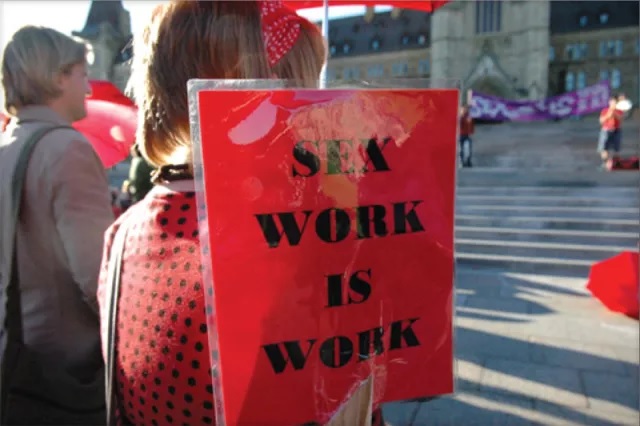
A sex-worker advocacy group has filed what could be a dramatic precedent-setting appeal in federal court, seeking a ruling that would overturn the laws against prostitution.
The case is based in San Francisco: The Erotic Services Provider Legal, Educational, and Research Project sued District Attorney George Gascon, as well as the DAs of Marin and Alameda counties and Attorney General Kamala Harris, arguing that all people have a privacy right that includes the right to engage in intimate activity as they choose, including with the exchange of money.

A federal judge dismissed the original claim, ruling that the laws against sex work are entirely valid. The Court ruled that
preventing a climate conducive to violence against women and potential human trafficking, preserving the public health, and deterring the commodification of sex
was a rational basis for the existing laws.
The appellants, represented by the noted civil rights lawyer H. Louis Sirkin, say that, among other things, people have a First Amendment right to association and to free speech and that speech – the agreement to engage in sex for money – can be a criminal offense in California.
The appeal is based on recent Supreme Court cases, including Lawrence v. Texas, the landmark 2003 decision that concluded that the right to private, intimate sexual conduct was protected by the 14th Amendment, and Obergfell v. Hodges, the 2015 ruling legalizing same-sex marriage.
The appeal argues that the laws against sex work have to have more than a “rational basis;” since they regulate the most intimate behaviors in people’s lives, the court needs to give those laws stricter scrutiny.
In Lawrence, the Court found that
Help us save local journalism!
Every tax-deductible donation helps us grow to cover the issues that mean the most to our community. Become a 48 Hills Hero and support the only daily progressive news source in the Bay Area.
Liberty protects the person from unwarranted government intrusions into a dwelling or other private places. In our tradition the State is not omnipresent in the home. And there are other spheres of our lives and existence, outside the home, where the State should not be a dominant presence. Freedom extends beyond spatial bounds. Liberty presumes an autonomy of self that includes freedom of thought, belief, expression, and certain intimate conduct.
The Court noted the “emerging awareness that liberty gives substantial protection to adult persons in deciding how to conduct their private lives in matters pertaining to sex.”
That decision has been cited, among other things, in rulings establishing the rights of people of buy sex toys.
The Ninth Circuit Court is pretty liberal, as the federal judiciary goes. And there’s certainly an argument here: If the best defense that the government can offer is that society needs to fight “the commodification of sex,” that battle is long over. Sex workers have long made the case that the best (and maybe only) way to effectively address violence against women in the sex trade and sex trafficking is to bring the business out of the darkness and into the light, where it can be regulated and monitored.
Everyone knows that it’s a longshot – but 20 years ago, when some state laws still made consensual homosexual conduct a crime, it was hard to imagine that the court would one day hold that same-sex marriage is protected by the Constitution.
I suspect that 20 years from now, the laws against sex work will be largely repealed, either by the legislative process or the courts. And this will be seen as a crucial moment in that struggle.
You can read the appeals brief in the case here.


It is interesting that people can go to Vegas, spend all their money and then some, poison themselves (or nearly so) with gross inibriation, watch live sex shows and porn to their hearts content, hook up any time or place but have to go out of town for a paid lay.
Get a license and set up an amateur porn shoot and bring friends to meet the pros and pay the pros with dues contributed by clientele
I wouldn’t hold my breath. Making it legal makes too much sense. Besides, the cops and prosecutors have too much invested in keeping it illegal. There’s a whole industry that feeds off the government gravy train of prohibition.
Interesting. Maybe people should get married and divorced every day or for a week. We have people in this country who have been married 5 or 6 times. I think prostitution should be legal. What the framework for that would look like I’m not sure. Even Nevada, where it is legal, restricts it to certain counties. Thanks for the story. I found it interesting.